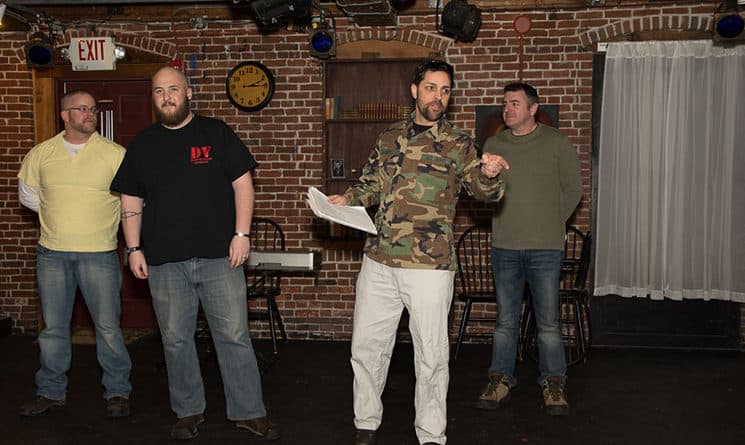At The Players’ Ring’s producers’ meeting, playwrights make a case for their shows
By Jenn Hastings, photos by Michael Sterling
Gary Locke was furious. The source of his anger? Politicians — namely, he explained to an audience at The Players’ Ring in Portsmouth, the several likely 2016 presidential candidates who believe the Earth is 6,000 years old and that a four-year college degree is a waste of time.
“By God,” he roared at the audience, “It’s time that we stand on a stage and we stand up for learning and science and what’s right!”
This was Locke’s pitch for a staging of Bertolt Brecht’s play “A Life of Galileo” for the Ring’s upcoming season. Though furious, Locke was also practical. He’d edit the script a little because, “frankly, Brecht can be a bit of a windbag.”
There was little room for windbags at the Ring on Feb. 23, as Locke and dozens of hopeful local playwrights and actors gathered to pitch their shows at the theater’s annual producers’ meeting. Each presenter had two minutes to make their case before a committee of producers and a live audience, and that meant the actors and writers used every strategy they could to leave a lasting impression: singing, dancing, bribery, and card tricks.
The card trick came courtesy of Andrew Pinard, who offered a card to Ginnie Lupi, director of the New Hampshire State Council on the Arts, who was there to watch the proceedings. It was part of his pitch for “Discovering Magic,” which he called “an interactive show with magic, comedy, slight of hand, and messing with your heads.” Some opted to mess with producers’ hearts, instead. Actor and playwright Miles Burns pitched his show “Hansel and Gretel” by performing a haunting song from the show that includes the lyrics, “Why do children have to die / and lose their mighty voices?”
G. Matthew Gaskell of Brownwater Productions pitches his original work, “Best Day Ever.”
The meeting acts as a sneak peek for the theater’s upcoming season — all of the 20 or so productions the Ring stages each year come out of the meeting. And though writers and actors aren’t required to physically pitch their project at the meeting (copies of the proposals and scripts are also submitted), it’s something of a tradition in the local theater scene.
This year’s pitches ran the gamut from the classics, including “Antigone,” to the completely unknown, with plenty in between, like a modern reinterpretation of Shakespeare’s “The Rape of Lucrece.” Some shows were based on historical figures and events: Newburyport, Mass. “abolitionist and rabble-rouser” William Lloyd Garrison, troubled writer Maxwell Bodenheim, and a murdered 19th-century Pembroke Academy student. Several scripts, such as Anna Smulowitz’s “Terezin,” were set during World War II. The play follows six children before they’re transferred to Auschwitz and is based on the experiences of Smulowitz’s parents, who survived the camp.
And then there were the silly, the whimsical, and the downright disturbing proposals. There was “Jenny 1538,” a funny play about a little girl named Helvetica who finds 11 days that history lost. Ed Valena’s “How to be a Dog: A Steaming Pile of Song and Dance” features such songs as “Lick ’Em If You Got ’Em,” and “It’s a Great Day to be a Dog,” which rhymes “flapping” with “crapping.” Valena was encouraged during last year’s pitch to tone down the bodily fluid references, but dogs will be dogs.
And then there was Joe Nelson’s “The Blackhouse Paintings,” about thieves who break into the home of a man who murdered his children and made paintings using their bodies. Nelson said that he would need “one hell of a props person, one hell of a sound person, and a cast that is willing to scare the crap out of people.”
“It’s great to know that this kind of artwork is being made every day in New Hampshire.”
— Ginnie Lupi of N.H. State Council on the Arts
Winning the committee over is not easy. Many pitchers noted that their projects would work well in the small theater because they require few actors or minimal set design. One piece, Paul Goodwin’s “The Smallest Room in the House,” takes place entirely in a family bathroom. A few suggested that their projects were timely: In her pitch for a rehearsed reading of Eugene O’Neill’s “Long Day’s Journey into Night,” Aimee Blesing noted that the play would be 80 years old in 2016, and Jay Harris said that September would be an ideal time to produce “The Towers,” a series of three interconnected monologues with Sept. 11–related themes. Bribery works, too: Members of the Stranger Than Fiction improv comedy troupe offered the panel a dozen eggs in the hopes that they can stage their 12th season at the Ring.
“I was impressed by the diversity of ideas, from classic to contemporary,” Lupi said later. “The number of playwrights pitching new work was particularly inspiring; it’s great to know that this kind of artwork is being made every day in New Hampshire.”
Now that the pitches have been made, an eight-member committee will review the scripts and make selections to the theater’s board of directors. Final selections will be revealed in April and may appear onstage as soon as a few months later.
Even if they don’t make it on the stage, the writers and actors and artists behind the pitches were happy to have a chance to show off, hone their work, and entertain their friends. In a given season, roughly half of the Ring’s productions come from local playwrights.
“I love the Ring. I love this space,” said Jill Thiele as she wrapped up her pitch. “Every summer I perform here, and it feels like home.”
A live audience listens to the pitches during the Ring’s annual producers’ meeting.

